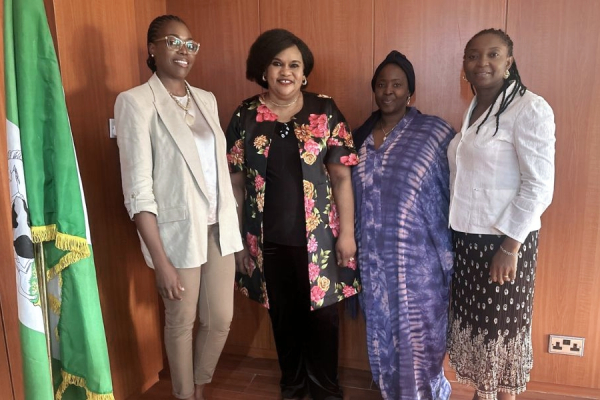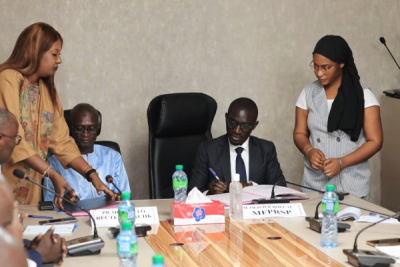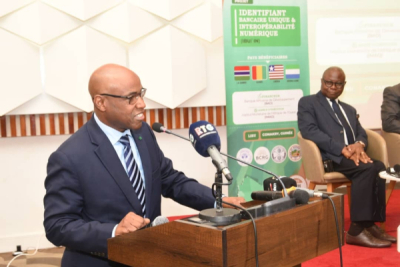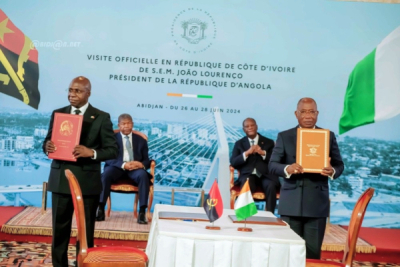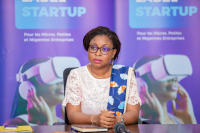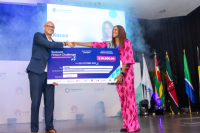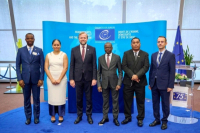Commitment to digital skills training in sub-Saharan Africa is set to significantly impact the region’s digital economy. By providing young Africans with essential skills, a new generation of African talent is empowered to thrive in the global digital landscape.
Chinese ICT giant Huawei has committed to training 150,000 young people in sub-Saharan Africa over the next three years through its LEAP (Leadership, Employability, Advancement, and Possibility) program. The announcement was made by Gao Xiang, president of Huawei sub-Saharan Africa, at the Huawei LEAP Summit 2024 held June 28 in Shanghai.
“The LEAP Framework targets pivotal areas including digital leadership, employability enhancement, skill advancement, and future opportunities across Sub-Saharan Africa,” Xiang stated.
Through the LEAP initiative, launched in April 2022, Huawei aims to equip students in the region with essential digital skills. Initially targeting 100,000 trainees by 2025, Huawei surpassed this goal by June 2024, training over 120,000 individuals. The company now plans to train an additional 150,000 young people over the next three years.
The LEAP Summit, focusing on ICT talent and sustainable growth, included participation from African government officials and ambassadors. Notable key African figures, including Dr. Beatrice Muganda Inyangala (Kenya's Ministry of Education), advocated for enhanced collaboration and training at universities to transform them into Huawei training hubs while Sophia Nantongo (Undersecretary of Uganda's Ministry of ICT) urged Huawei to set up manufacturing plants in Uganda to lower gadget costs and improve ICT access.
According to the e-Conomy Africa 2020 report by the IFC and Google, Africa’s digital economy is forecasted to reach $180 billion by 2025 and $712 billion by 2050. This highlights significant potential for growth and innovation, contingent on addressing the digital skills gap. Investing in digital education is essential to unlock this potential and position Africa as a global hub for technological advancement.
Hikmatu Bilali
Many regions across Africa face significant barriers to healthcare access due to the low penetration of health insurance, particularly among the informally employed. However, leveraging advanced satellite technology can help overcome these obstacles and enhance healthcare equity across the continent.
Nigerian Communications Satellite Limited (NIGCOMSAT) has partnered with the National Health Insurance Authority (NHIA) to launch the e-NHIA project, aiming to revolutionize healthcare access across Nigeria, NIGCOMSAT announced on June 27. Leveraging satellite technology, the initiative seeks to improve transparency, accessibility, and efficiency in delivering health insurance services nationwide.
We had a productive business meeting... - NIGCOMSAT Limited | Facebook
"This partnership with NHIA highlights our commitment to leveraging technology for positive impact," said a spokesperson from NIGCOMSAT.
This collaboration underscores a commitment to innovation and equitable healthcare provision, promising to enhance access to essential health services for millions of Nigerians.
A 2021 report by Dataphyte, a Nigerian media research and data analytics organization, reveals that 97% of Nigeria's population lacks health insurance coverage, with only 3% covered through employee health plans. This significant gap in health insurance coverage highlights the urgent need for innovative solutions to increase access. According to Nigerian Communications Commission (NCC) data, as of March 2024, Nigeria has a teledensity of 101.16%. However, this figure does not reflect the number of internet users, as many people use multiple SIM cards. Despite this, the high teledensity offers significant potential for leveraging digital platforms, such as NIGCOMSAT, to promote and manage health insurance services.
By utilizing technology, it is possible to facilitate the enrollment process, handle premium payments, and provide access to vital health information. This approach can make it easier for the uninsured population to participate in health insurance schemes, ultimately improving healthcare access and financial protection for millions of Nigerians.
Hikmatu Bilali
On Monday, July 1, Senegalese Minister of Public Service and Public Service Reform (MFPRSP), Olivier Boucal, and the rector of Cheikh Hamidou Kane Digital University (UN-CHK), Moussa Lo, signed a partnership agreement. Under this partnership, UN-CHK will provide its digital expertise to the MFPRSP for transforming the public sector and digitizing public services. The partnership also includes training and capacity building for public service employees in the digital domain, among other initiatives.
On Wednesday, June 26, the West African Monetary Institute (WAMI) launched the Unique Banking Identifier and Digital Interoperability Project in Guinea, The Gambia, Sierra Leone, and Liberia. Financially supported by the African Development Bank, the project aims to develop the financial system of the West African Monetary Zone (WAMZ), promote economic growth, reduce poverty, and enhance financial inclusion for successful economic and financial integration in West Africa.
On Thursday, June 27, Kalil Konate, the Ivorian Minister of Digital Transition and Digitalization, and Téte António, the Angolan Minister of Foreign Affairs, signed a cooperation agreement during Angolan President João Lourenço's visit to Côte d'Ivoire. The agreement aims to pool efforts to enhance the use of technological tools and improve public service delivery in both countries.
On Wednesday, May 29, the UK-based venture capital firm Leo Lion opened applications for its Future of Capitalism 2024-2025 contest. This global competition offers up to $1 million in investment to startups developing technologies aimed at improving business operations. Applications close on September 30, 2024. Eight finalists will be invited to London for Pitch Day, which will take place in February 2025.
On Tuesday, June 25, Beninese Minister of Digital and Digitalization, Aurélie Adam Soulé Zoumarou, inaugurated the Technical Committee for Startup Labeling. Composed of seven members appointed for a renewable two-year term, the committee will be responsible for receiving and reviewing applications from micro, small, and medium enterprises. It will periodically publish the list of labeled startups, notify applicants of the decisions resulting from the application review, and issue decisions on the revocation of granted labels.
In June 2024, Ecobank opened applications for the seventh edition of its Fintech Challenge. This competition invites both mature and startup fintech companies to collaborate with the bank for a chance to win a grand prize of $50,000. Finalists will have the opportunity to integrate their solutions into Ecobank’s network, which spans 35 African countries. Applications close on July 7, 2024.
On Thursday, June 20, Benin officially adhered to the Council of Europe Convention on Cybercrime, signed in Budapest, Hungary, in 2001. The goal is to strengthen its legal framework to enhance its cyberspace and combat cybercrime more effectively.
Trained as an urban planner, she aims to improve the quality of life for Africans. She leads a tech company that creates digital solutions for the health and finance sectors.
Scarlett Zongo, a Burkinabè tech entrepreneur, urban planner, and sustainable development consultant, is revolutionizing the lives of Burkinabè with her digital solutions. As the co-founder and CEO of Aino Digital, a tech company founded in 2019, Zongo aims to improve daily life and promote sustainable development in Africa through innovative digital services.
Aino Digital's flagship product is Sauvie, a digital identity device available as bracelets or cards with QR codes. Sauvie stores personal health information and emergency contacts, facilitating patient care in health centers and sending automatic SMS alerts to relatives in emergencies. The project won first prize at the POESAM (Orange Social Entrepreneur Prize in Africa and the Middle East) in 2022.
The startup's second product, Yelkaï, is a digital micro-savings solution that enables users to save with microfinance institutions by creating virtual accounts. Users can easily and securely save as little as 100 FCFA using electronic money.
In addition to her work at Aino Digital, Zongo founded Cité Branchée in 2016, a service and consulting firm specializing in urban planning and sustainable development, where she serves as CEO. Cité Branchée aims to promote sustainable cities in Africa.
Zongo holds a master's degree in environmental engineering from the École de technologie supérieure du Québec, obtained in 2013. She began her career in 2013 at Mobi-O, a Quebec-based sustainable mobility company, where she worked as a project manager. Upon returning to Burkina Faso, she joined the Ouagadougou City Council in 2017 as a technical advisor on environment and sustainable development. In 2022, she became a consultant for the diagnostic assessment of Ouagadougou's green belt and contributed to drafting the EXAF project: Digital Solutions for Sustainable Cities in Africa, for the Swiss Federal Institute of Technology in Lausanne.
Melchior Koba
More...
The development of fintech startups in Africa has provided alternatives for populations excluded from traditional financial services. Thanks to these solutions, they can save or invest according to their means.
Ejara is a fintech solution developed by a Cameroonian startup, allowing users to access financial services through its mobile application. Founded in 2020 by Nelly Chatue-Diop, Baptiste Andrieux, and Tierno Tall, the Douala-based startup successfully raised $8 million in funding in 2022 to democratize access to digital investment and savings products and support its growth across the continent.
"In Africa, most people don't have the safety net of a pension fund, and some clients use Ejara for that. There are users, particularly mothers, who use the platform to invest in their children's university education. We also have a small portion of our customer base who are wholesalers, handling large volumes; they use crypto to fund and purchase goods from foreign suppliers through this method," explained Nelly Chatue-Diop.
The Ejara app is available on both iOS and Android and has already been downloaded over 100,000 times from PlayStore. After downloading, users create an account to access the startup's various services. Among other features, they can save funds and earn up to 5% annual interest or buy and sell cryptocurrencies. From Bitcoin to Tether, Ethereum to Binance Coin, the Cameroonian fintech offers Africans access to these digital currencies.
Ejara's system is based on blockchain technology, ensuring secure transactions. Additionally, the fintech has implemented a gateway that allows users to top up their digital wallets via mobile money. With just 1,000 CFA Francs (approximately $1.63), users can start saving or investing on the Cameroonian startup’s mobile platform.
"The integrated transparency and security offered by the blockchain, combined with the popularity of mobile banking services in Africa, made me realize that a mobile investment platform based on blockchain was the key to expanding financial inclusion," stated Nelly Chatue-Diop.
Adoni Conrad Quenum
After studying in France, he returned to Mali to venture into entrepreneurship. Today, he actively contributes to the financial inclusion of all segments of the African population through his fintech solution, Sama Money.
Daouda Coulibaly (photo), a Malian entrepreneur, operates in the fields of new technologies and digital finance. He is the founder and CEO of Sama Money, a tech company specializing in money transfers and mobile payments.
Founded in 2020, Sama Money's mission is to promote financial inclusion in Africa. The company offers a comprehensive range of digital payment services to individuals, businesses, and public services, including money transfers and withdrawals, payment of electricity and water bills, mobile phone top-ups, and insurance policy payments.
"This 100% Malian Fintech offers an innovative and tailored money transfer and payment solution that meets the needs of the population. Our multi-operator offering and multiple access channels ensure our services are accessible to everyone," states Daouda Coulibaly. Sama Money's services are available via the web, a mobile app, WhatsApp, and a USSD code, covering Mali, Burundi, and Côte d'Ivoire.
In addition to Sama Money, Daouda Coulibaly is the president of the Mali Fintech Association, which promotes financial inclusion in Mali, especially for those excluded from the traditional financial system. He also founded Malijet.com, a news website, in 2008, and Trainis, a professional training center he led until May 2024.
Daouda Coulibaly holds a master's degree in regional planning from Paris 1 Panthéon-Sorbonne University, obtained in 2005. He also earned an MBA from IAE France, a federation of 38 university management schools, in 2009.
Melchior Koba
The African Union Convention on Cyber Security and Personal Data Protection was adopted in 2014 in Malabo, Equatorial Guinea. Ten years later, Madagascar has joined the list of countries that have ratified it.
Last week, the Malagasy Ministry of Digital Development, Posts, and Telecommunications announced Madagascar's accession to the Malabo Convention on Cyber Security and Personal Data Protection. The aim is to ensure a safer cyberspace and effectively combat cybercrime.
With this accession, Madagascar will be able to "integrate the legal benchmarks regarding the implementation of personal data protection policies by the CMIL (Malagasy Commission for Computing and Freedoms) and the ANSSI (National Agency for the Security of Information Systems or CIRT in English)."
This move comes at a time when cybersecurity has become a crucial component due to the acceleration of digital transformation across the continent. African countries have been compelled to address this issue, and since the COVID-19 pandemic, many have expedited the ratification of the African Union Convention on Cyber Security and Personal Data Protection, adopted in 2014 in Malabo.
The Convention aims, among other things, to protect personal data within the framework of cybersecurity legislation; facilitate cooperation to ensure the security of personal data and combat digital crime by promoting information exchange between national entities; use electronic technologies to secure personal data at the national level; and combat cybercrime by establishing specific entities in each signatory country.
According to the 2020 edition of the "Global Cybersecurity Index" published by the International Telecommunication Union, Madagascar has a cybersecurity index of 23.33 and ranks 24th in Africa, just ahead of Guinea (20.53) and behind Mozambique (24.18).
It is noteworthy that Angola, Benin, Togo, Senegal, Rwanda, Namibia, Niger, Mauritius, Mozambique, Ghana, Zambia, the Democratic Republic of Congo, Cape Verde, Guinea, Ivory Coast, and Mauritania have already ratified the convention.
Adoni Conrad Quenum
Over the past five years, the African video game market has experienced rapid development. Previously almost non-existent, it has gradually gained international visibility thanks to the efforts of numerous local studios.
On Friday, June 28, the American video game publisher Xbox, owned by Microsoft, honored Cameroonian game studio Kiro’o Games. Xbox showcased an exclusive trailer on its ID@Xbox YouTube channel, which promotes the best upcoming indie games for Xbox One and Windows PC, celebrating Kiro’o Games’ 20 years of work. This promotional communication comes a month after the release of “Aurion: Legacy of the Kori-Odan,” developed by Kiro’o Games, on Xbox Series X|S and Xbox One.
The Xbox trailer highlights the evolution of Aurion from a small amateur project on RPG Maker to an independent game with beautiful hand-drawn graphics. The original game was created using the XNA framework, which was freely offered by Microsoft at the time and allowed many studios to embark on their independent ventures.
“Aurion: Legacy of the Kori-Odan” is an action-RPG set in an African Fantasy context inspired by classic J-RPGs like “Tales of.” It draws on African myths and legends, offering real-time combat in a 2D view. Players take on the role of the exiled king or queen of Zama, aiming to harness their “aurionic” power to build a world where everyone can understand each other despite their differences. The game’s narrative focuses on the challenge of remaining altruistic in a cynical and selfish world.
“We know the current situation is tough for everyone. That's precisely why we hope players will discover the Kori-Odans and be inspired by the message hidden in their Legacy and in Aurion. If you’re a humanist idealist feeling crushed by the world's coldness, Aurion is written for you,” explains Olivier Madiba, founder of Kiro’o Games and creator of Aurion.
Since 2013, the African video game industry has been growing. Across the continent, a generation of enthusiasts is mobilizing to exchange experiences and develop higher quality products. The goal is to showcase African stories and expertise. This is one of the reasons why a dozen game studios decided in February 2022 to pool their efforts within a group, the Pan Africa Gaming Group (PAGG), of which Kiro’o Games is a member.
According to consulting firm Verified Market Research, “the African video game market is growing rapidly due to the increasing adoption of smartphones, improved internet access, and a younger, tech-savvy population. Affordable mobile devices and better internet infrastructure have made online gaming more accessible to a wider range of people, increasing the demand for localized content that reflects the continent’s cultural and linguistic diversity.”
“Urbanization and rising disposable incomes have given birth to a growing middle class eager for digital entertainment, pushing game creators to offer specialized experiences to African gamers. This is expected to drive the market revenue to exceed $2.14 billion by 2024 and reach a valuation of approximately $3.72 billion by 2031,” the consulting firm adds.
For the Cameroonian studio, the confidence shown by Xbox will allow it to reach a vast potential player base worldwide, ensuring visibility, credibility, and revenue opportunities.
Muriel Edjo



